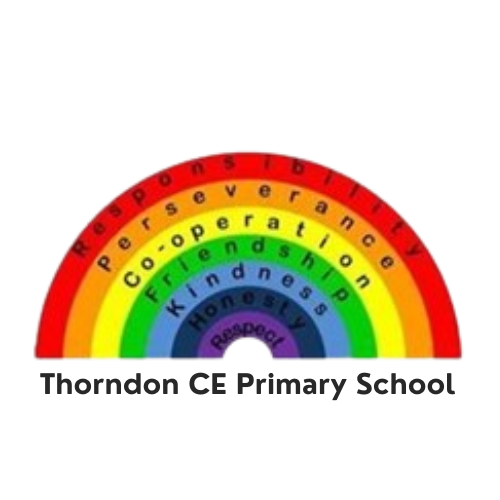Reading
Our approach to teaching reading at Thorndon is based on developing the full range of skills involved in this complex process. Children are encouraged to develop a love of books and are given many opportunities to listen to stories, to share books with each other and to choose fiction and non-fiction. On starting school they are encouraged to take books home to read and talk about with their parents and a dialogue is started between school and home in the form of their reading record. This includes both decodable texts and books chosen for shared enjoyment. We use a teaching approach based on systematic synthetic phonics as set by the scheme 'Read, Write Inc.' It is structured and tailored to the needs of
- All children take home 3 books weekly.
- Reading book according to their level.
- Reading spine book- These books have been carefully selected for the children to experience during their time in each class.
- Library book.
We teach children comprehension skills through 'Reading Vipers'. This is to encourage children to actively think about the comprehension skills they are using when they read.
VIPERS is a mnemonic we use at school to cover the key comprehension skills that we teach as part of the National Curriculum. The term ‘Reading VIPERS’ was created by Rob Smith from The Literacy Shed, a website which provides a wide range of interesting and engaging resources for teaching English.
These are:
V - Vocabulary
I - Infer
P - Predict
E - Explain
R - Retrieve
S - Sequence (KS1) or Summarise (KS2)
Throughout our Early Years and Key Stage 1 classes, children will be introduced to these terms gradually, with each explained and contextualised. Once children reach Key Stage 2, they will be exposed to all of these terms regularly throughout their English work and other areas of the curriculum.
We understand that reading underpins the entire curriculum and enables children to unlock the breadth of subjects taught at primary level and beyond. Reading is an essential life skill and can form a key part of helping children to form diverse cultural capital, enabling them to effectively participate in society.
Please find a list of websites that you may find useful in helping you and your child learn about phonics. Games and fun activity websites are also included.
http://jollylearning.co.uk/ - Games and information for parents
http://www.phonicsplay.co.uk/ - many games to play
http://www.bbc.co.uk/bitesize/ks1/literacy/phonics/play/ - fun games for the children to play
http://www.ictgames.com/literacy.html - fun games for the children to play
http://www.kenttrustweb.org.uk/kentict/kentict_home.cfm - fun games for the children to play and information for parents
http://www.ngfl-cymru.org.uk/ - fun games for the children to play
http://www.starfall.com/ - fun games for the children to play
http://www.firstschoolyears.com/ - fun games for the children to play
BBC Bitesize - many games to play covering all areas of the curriculum


